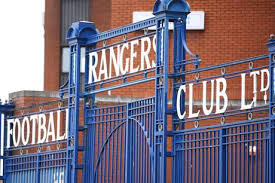By Matt Scott
May 5 – Glasgow Rangers escaped being stripped of historic league titles by the Scottish Football Association on false pretences, a report by the Tax Justice Network (TJN) has alleged.
The report claims that the SFA commission of inquiry headed by Lord Nimmo Smith to investigate the circumstances of Rangers’ financial collapse was misled into believing that its tax affairs had been legally permitted.
The TJN report details how the erroneous information received by the commission arose from witness testimony given by Campbell Ogilvie, the former Rangers club secretary and SFA president. Ogilvie did not respond to the TJN’s requests for comment.
The matter relates to the two cases HM Revenue & Customs (HMRC) brought against Rangers and precipitated the club’s financial demise, from which followed their relicensing as a new club in Scottish football’s bottom professional tier. At least three former Rangers players, Craig Moore, Tore Andre Flo and Ronald De Boer, were paid through a complicated offshore Employee Benefit Trust (EBT) known as a Discounted Options Scheme (DOS).
When in March 2011 HMRC came knocking with a demand for a settlement of £2.8 million in unpaid taxes over those players, the scheme had already been ruled unlawful. Rangers’ then tax lawyer, Andrew Thornhill QC, recommended paying the settlement in response to the taxman’s claims the club’s EBT specifically amounted to “the deliberate failure or fraudulent behaviour of the company” around a “sham set of arrangements”.
It meant that wages paid to De Boer, Rangers’ top scorer in 2001-2 when they won the Scottish Premier League title on goal difference, had unlawfully evaded tax. Yet the SFA-appointed independent commission did not apply any sporting sanctions as it found there had been no wrongdoing on the part of Rangers.
This was because in the ‘Big Tax Case’, Scotland’s first-instance court had found in favour of the club over an entirely separate, offshore, tax-avoidance EBT scheme. In the event, that finding has been overturned on appeal in Scotland’s higher Court of Session, but in any case there was never at any point a reason to consider the DOS scheme anything but unlawful – the club had accepted as much in correspondence with the taxman.
Nonetheless, the commission ruled that the two separate and entirely different cases should be considered as one. “We note that the Murray Group Management Remuneration Trust was preceded by the Rangers Employee Benefit Trust, but we are not aware that they were different trusts. We shall treat them as a continuous trust, which we shall refer to throughout as the MGMRT.”
This was a grave mistake on behalf of the Nimmo Smith commission but one it was led to on the basis of the facts available to it. Nobody connected with Rangers told them the truth of the matter. Indeed the TJN alleges one witness, Ogilvie, chose to withhold information when asked specific questions relating to EBTs.
He told the commission he had “nothing to do” with the EBT schemes, repeating what he had told Scotland’s The Herald newspaper in an interview given in 2013, in which Ogilvie stated: “The EBTs were set up around 2001 at Rangers and I’ve never hidden from the fact that I was then a director at the club. But I didn’t get involved in the financial management of the club in that context.”
Yet the TJN’s documents show that in 1999 Ogilvie had attended a board meeting whose minutes show he was assigned responsibility for setting up the offshore shell company that would be the payment vehicle for the DOS EBT payment made to Craig Moore. As the TJN points out: “He was in fact a central figure in establishing the discounted options scheme used to pay Craig Moore.”
It was on the evidence of this former senior Rangers employee, and now SFA president, that a key element of the commission’s decision not to apply sporting sanctions – points deductions or stripping of historical titles – was based. When presented with the facts of the case by TJN, the SFA declined to comment, earning a stinging rebuke in the TJN report.
“Perhaps Ogilvie simply forgot, and by chance that forgetfulness saved his longstanding club and employer from being stripped of many titles,” the TJN said. “What is not credible is the SFA’s response. When presented with evidence that the inquiry into the breaking of their rules had been misled by their own former President, with the result that a club they regulated may have wrongly held won championships, it cannot be acceptable that the SFA say nothing.
“Changes are clearly needed in relation to the handling of conflicts of interest within the governing body, and to the processes of member club accountability for malfeasance. In relation to the specific case at hand, it is difficult to see a continuing role for those involved in the decision-making at the time, and in the subsequent failure to address the demonstrated errors of the inquiry’s findings.”
With court cases now under way in relation to the conduct of Rangers and its former owners, it is clear many elements of its operations and the regulatory decisions relating to them were extremely badly handled. On the basis of a misleading licence application, UEFA handed Rangers a Champions League licence in 2011-12 when the club had outstanding tax liabilities, in contravention of the rules over unpaid debts to tax, player and club creditors.
TJN concludes: “We recommend the establishment of a fully independent inquiry, as a crucial step to begin the slow process of re-establishing the legitimacy of Scottish football’s regulatory body.”
Contact the writer of this story at moc.l1751320398labto1751320398ofdlr1751320398owedi1751320398sni@t1751320398tocs.1751320398ttam1751320398

